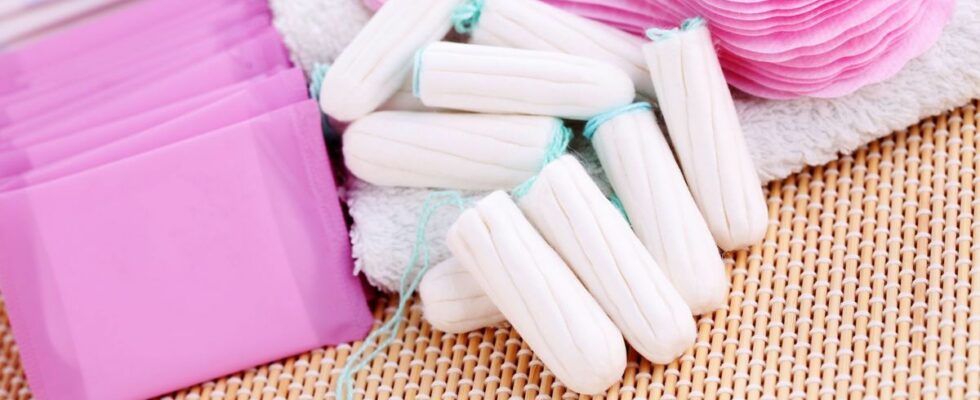Published on
Updated
Reading 3 min.
According to a new study by American scientists, different types of tampons are contaminated with toxic metals. This discovery is only the beginning of this work, because the researchers do not yet know if this contamination poses risks to the health of women who use them.
Used by many women during their periods, tampons are period protection made of cotton, to be inserted into the vagina and directly in contact with its mucous membrane. The main danger of tampons was until now the risk of toxic shock, but American researchers denounce another problem…
For this work, the researchers studied 14 different brands of tampons, purchased in stores in the United States, the United Kingdom and Europe, between September 2022 and March 2023. They looked for the presence of 16 different metals: arsenic, barium, calcium, cadmium, cobalt, chromium, copper, iron, mercury, manganese, nickel, selenium, strontium, vanadium, zinc, but also lead, for which there is no safe level of exposure.
According to their results, they discovered “measurable concentrations” of all the metals sought in the different periodic protections analyzed.To our knowledge, this is the first paper to measure metals in tampons. It is concerning that we found concentrations of all the metals we tested, including toxic metals such as arsenic and lead.” comments Jenn A. Shearston, lead author of the study and postdoctoral researcher at the University of California, Berkeley.
The highest concentrations were indeed those of lead, cadmium and arsenic. On the other hand, the scientists did not find significant concentrations of mercury or chromium. Finally, they noted a difference with organic tampons, which contained less lead but more arsenic than conventional tampons.
Scientists are concerned because of the vagina’s “highly absorbent” capacity
When these results were published, American researchers expressed concern, due to the “highly absorbent” capacity of the vagina in women.
“This study is a first step because even though we found metals in tampons, we don’t know if the metals can leak out of tampons and be absorbed into the body. We don’t know if the metals in tampons have any impact on health.” explains Jenni Shearston to our colleagues at Euronews Health.
The question arises especially for young girls and women who have been using this type of menstrual protection for years.This is why it is really important that we continue to study tampons, especially because so many people use them, sometimes for decades.” she added.
Should we be concerned about the results of this study?
Metals can end up in tampons in a number of ways: the cotton may have absorbed the metals from water, air, soil, through a nearby contaminant (for example, if a cotton field is near a lead smelter), or some may have been intentionally added during manufacturing as part of a pigment, bleach, antibacterial agent, or other process in the factory producing the products.
The metals found in tampons are also found in other everyday products, such as towels, bed linens and clothing, according to Kabrena Rodda, group leader and senior advisor in analytical chemistry and instrumentation at the Pacific Northwest National Lab in the United States, which is responding to Euronews Health. Carrying out blood tests to determine the proportion of contamination from tampons for women who use them is therefore complex.
For Graham Peaslee, professor of physics at the University of Notre Dame in the United States, also interviewed, “Zinc appears to be intentionally added to many tampons” and he is also “found in other textiles, such as menstrual panties“.
“Copper and zinc are often added to textiles such as cotton to reduce odors because they are antimicrobial.” he said. Before adding that the lead and arsenic concentrations did not seem very high, and that tampon users did not have to worry about them.
However, scientists want to continue their work to establish whether or not tampons pose a health risk. The authors hope that manufacturers will be required to test their products for these toxic metals before selling them.

